
Previously the staff writer for physical sciences at Science News, Maria Temming is the assistant managing editor at Science News Explores. She has undergraduate degrees in physics and English from Elon University and a master's degree in science writing from MIT. She has written for Scientific American, Sky & Telescope and NOVA Next. She’s also a former Science News intern.

Trustworthy journalism comes at a price.
Scientists and journalists share a core belief in questioning, observing and verifying to reach the truth. Science News reports on crucial research and discovery across science disciplines. We need your financial support to make it happen – every contribution makes a difference.
All Stories by Maria Temming
-
 Tech
TechA smartwatch app alerts users with hearing loss to nearby sounds
With a new smartwatch app, users who are deaf or hard of hearing can get alerts that an alarm is going off or someone is knocking at the door.
-
 Space
SpaceJupiter may host atmospheric ‘sprites’ or ‘elves’ never seen beyond Earth
For the first time, NASA’s Juno spacecraft may have spied the bright, superfast light show on another world.
-
 Physics
PhysicsA photon’s journey through a hydrogen molecule is the shortest event ever timed
The shortest duration ever measured is 247 zeptoseconds, or trillionths of a billionth of a second.
-
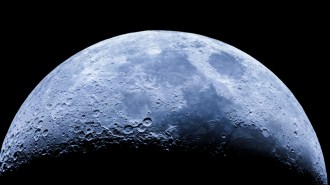 Space
SpaceWater exists on sunny parts of the moon, scientists confirm
New observations of the moon, made by a telescope flying onboard a Boeing 747-SP jet, have confirmed the presence of water on sunlit areas of the moon.
-
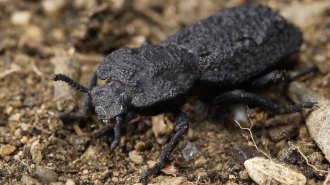 Animals
AnimalsThe diabolical ironclad beetle can survive getting run over by a car. Here’s how
The diabolical ironclad beetle is an incredibly tough little creature. A peek inside its exoskeleton reveals what makes it virtually uncrushable.
-
 Oceans
OceansEven the deepest, coldest parts of the ocean are getting warmer
Deep-sea temperatures seem to be rising, but it’s too soon to say whether that’s a result of climate change caused by humans, researchers say.
-
 Chemistry
ChemistryHeating deltamethrin may help it kill pesticide-resistant mosquitoes
A simple chemical trick creates a much faster-acting form of a common insecticide, which could help fight malaria and other mosquito-borne illnesses.
-
 Astronomy
AstronomyTurning space images into music makes astronomy more accessible
Music created from telescope data helps people with blindness and visual impairments experience the wonders of astronomy, and could aid research.
-
 Earth
Earth50 years ago, scientists were looking for ways to predict earthquakes
Though earthquake prediction remains elusive, early warning systems can help keep people safe.
-
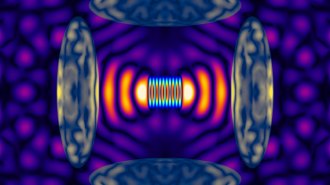 Tech
TechA new thermometer measures temperature with sound
An acoustic thermometer takes temperature by listening to the faint hum that objects give off when they get hot.
-
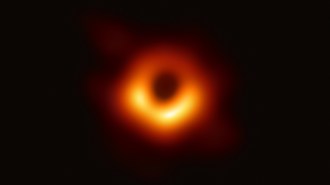 Space
SpaceEHT data show turbulence makes the glowing ring around M87’s black hole wobble
Event Horizon Telescope data spanning nearly a decade reveal that the appearance of the supermassive black hole inside galaxy M87 changes over time.
-
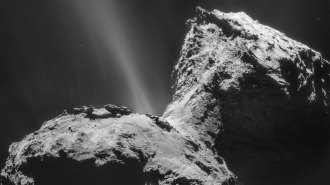 Planetary Science
Planetary ScienceRosetta data reveal an invisible ultraviolet aurora around comet 67P
Solar wind electrons smash water molecules in the comet’s coma to make the 67P/Churyumov-Gerasimenko’s version of the northern lights.